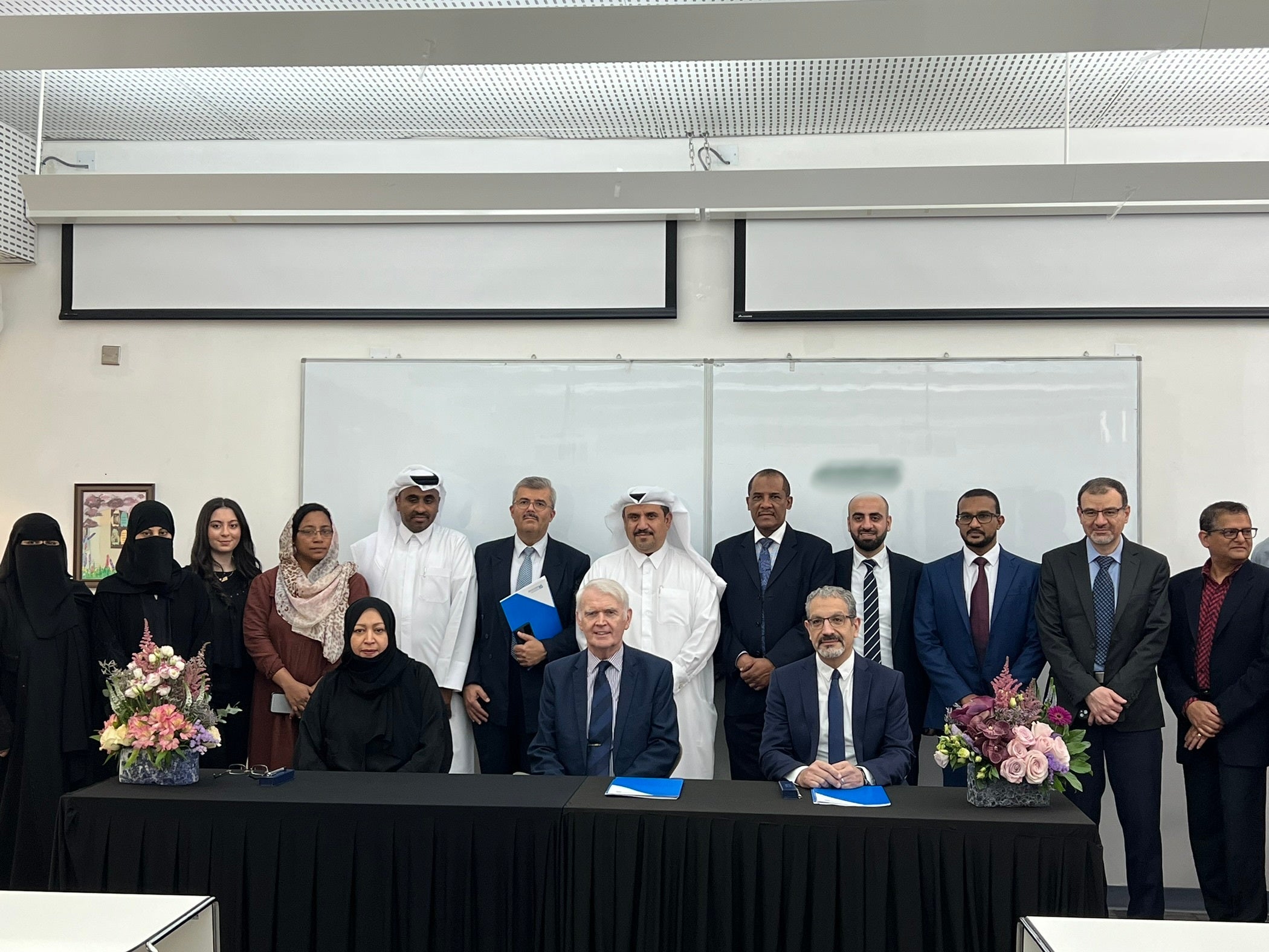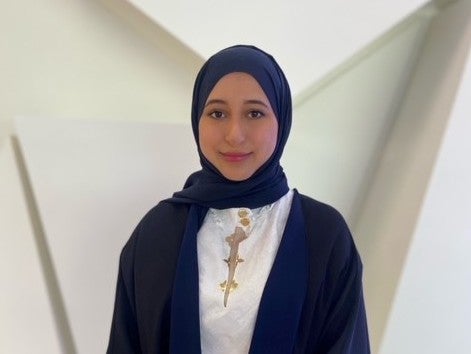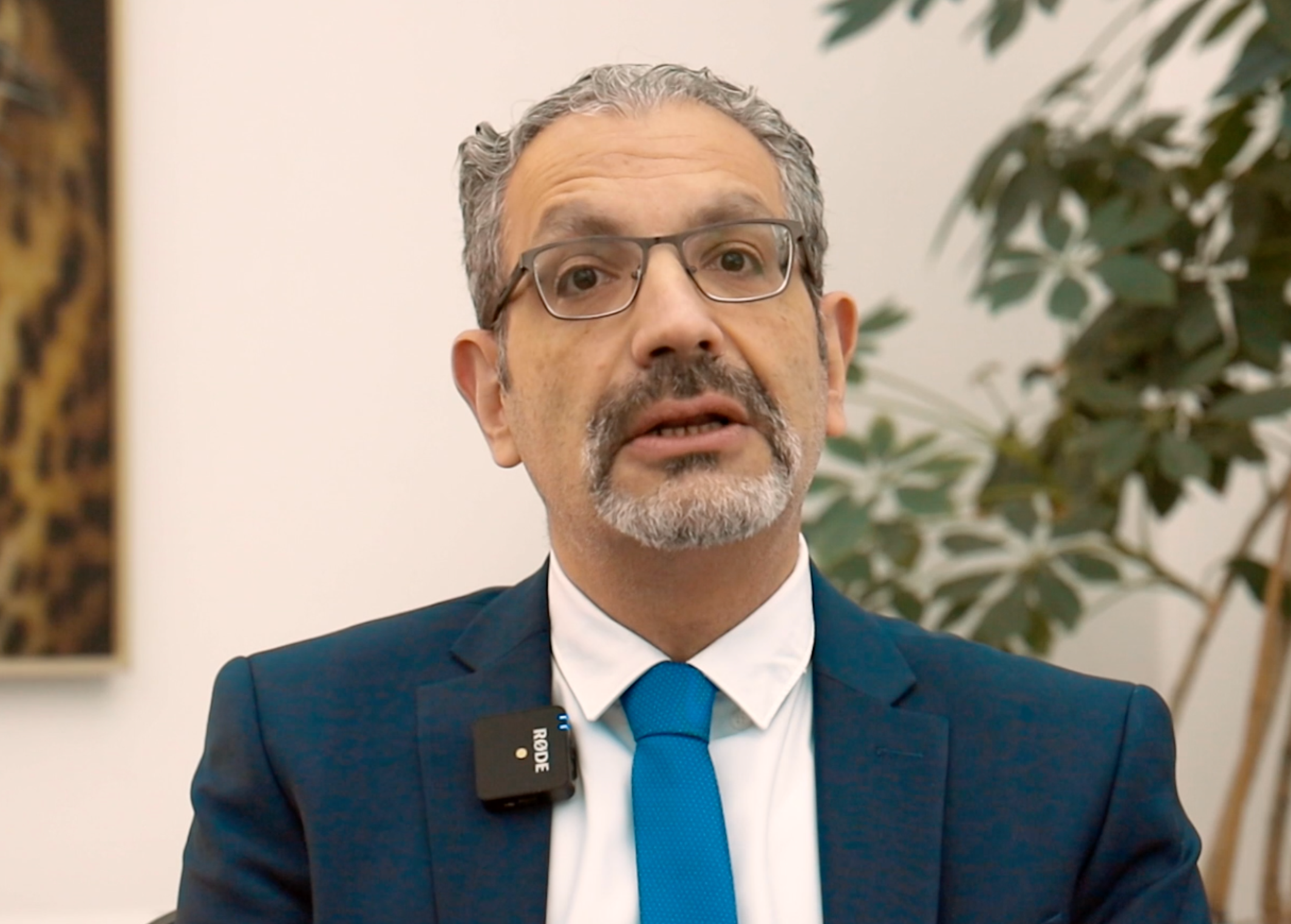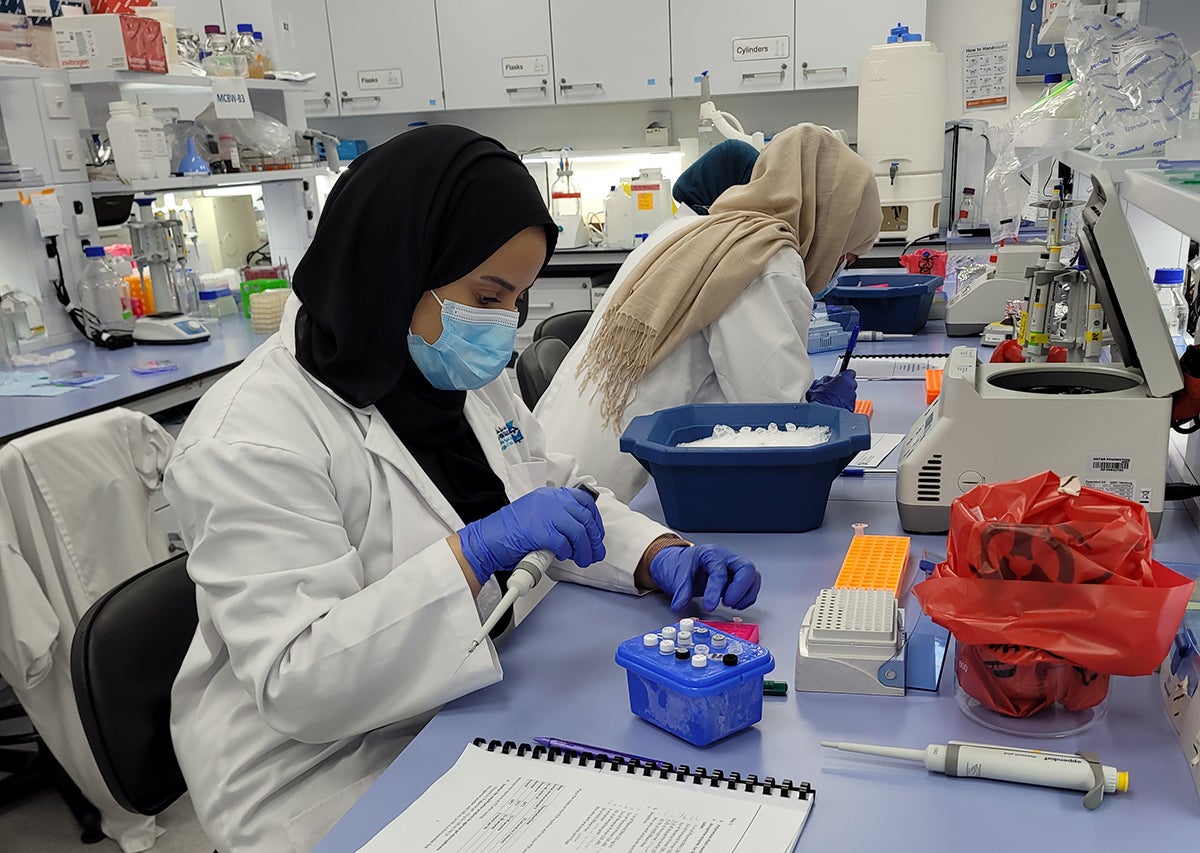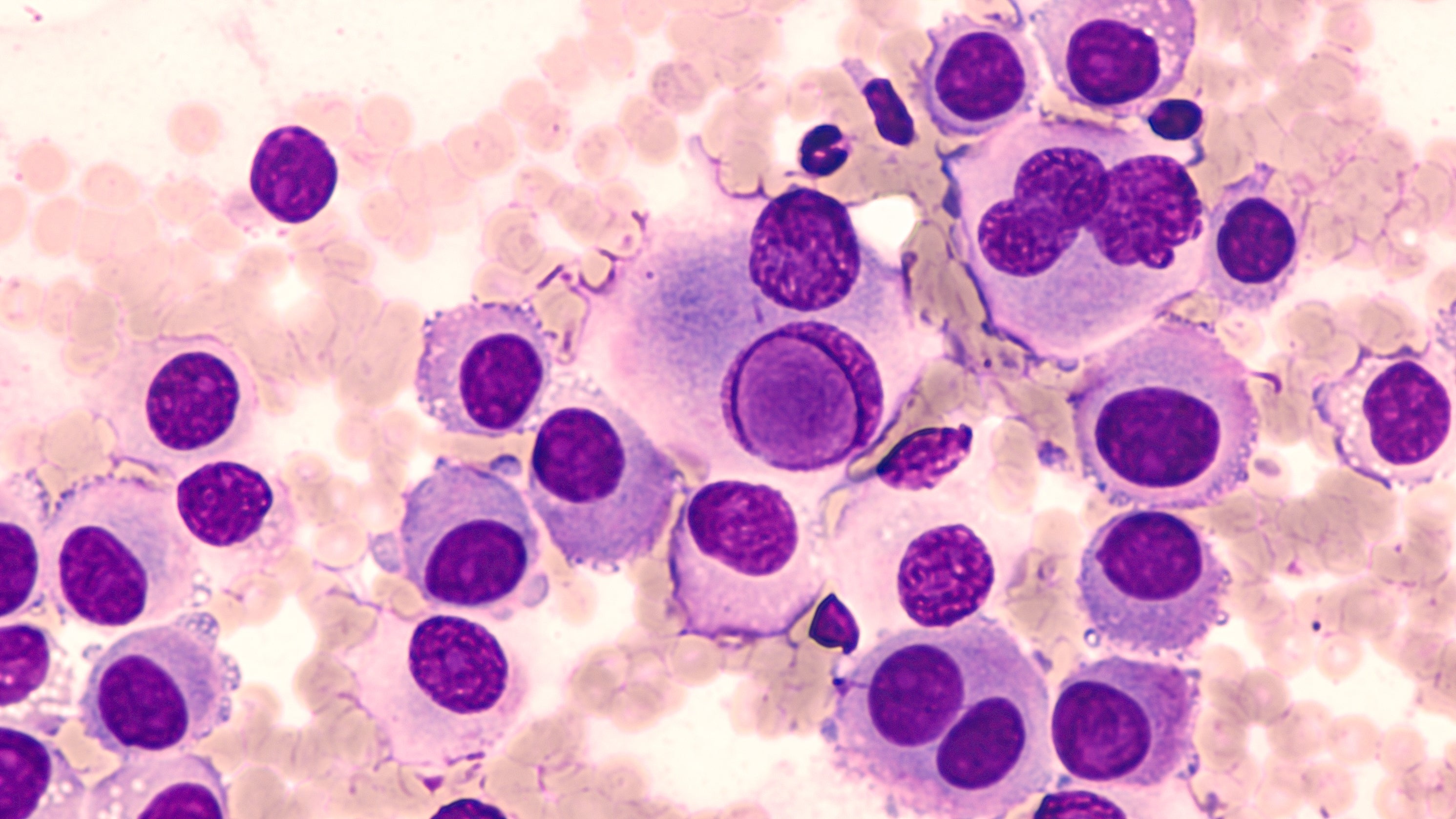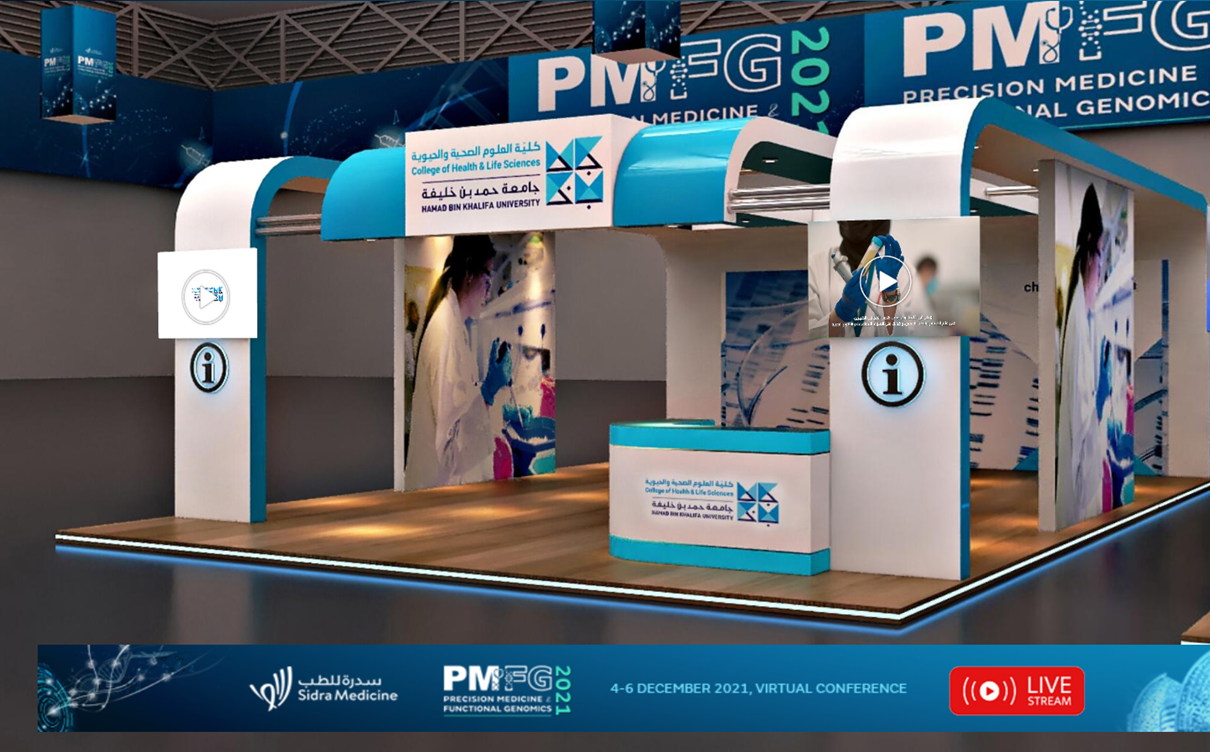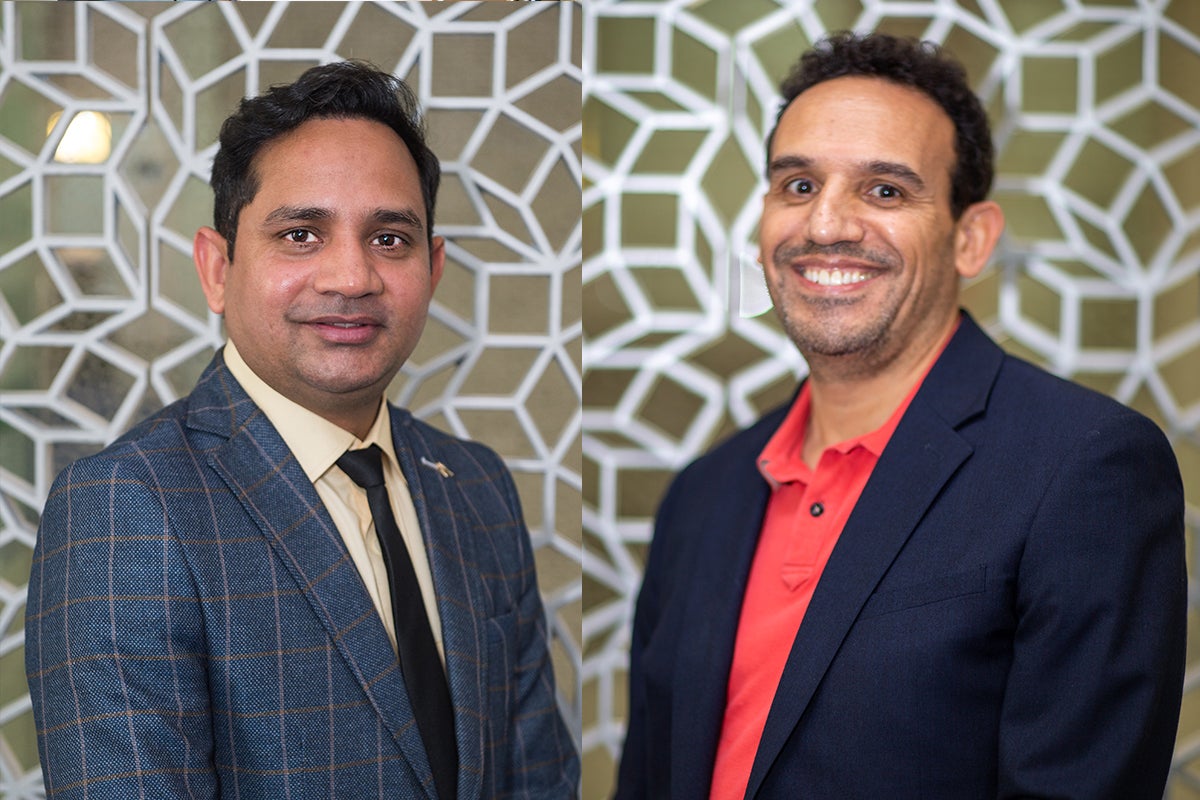
Links Between Genomics and Disease Prevention Explored
Renowned Harvard academic shares recent clinical and biomedical advances with potential to inform future healthcare

The College of Health and Life Sciences (CHLS) at Hamad Bin Khalifa University (HBKU) recently presented a talk highlighting advances in using genomic information to predict and prevent coronary artery disease (CAD).
The event welcomed guest speaker Dr. Akl Fahed, interventional cardiologist at Massachusetts General Hospital, who is also an instructor in medicine at Harvard Medical School and an affiliated scientist at the Broad Institute of MIT and Harvard. Dr. Fahed’s presentation tackled the interplay of genomics and non-genomic risk drivers and the use of genomic information to advance preventive care in the clinic.
CAD is the most common form of heart disease, occurring when arteries that supply blood to the heart muscle become narrowed. In his research, Dr. Fahed has argued that blood pressure, lifestyle risks, and the role of genetic conditions inherited from families are all important factors to develop more fully integrated risk models.
CHLS faculty and graduate students actively participated in the interactive webinar as it closely aligned with their own research projects in the fields of biomedical sciences, genomics, precision medicine, and exercise science.
CHLS delivers innovative Master of Science and PhD programs in Biological and Biomedical Sciences and in Genomics and Precision Medicine. The college recently announced a competitive Qatar Genome-CHLS Scholarship to accelerate discoveries in genomic medicine.
Dr. Hend Mansoor, Assistant Professor at CHLS, commented: “Dr. Fahed’s presentation highlighted important work in the area of cardiogenomics to our scientific community at CHLS. We appreciated his insights and the opportunity to show how this can improve diagnosis and the potential for precision treatments. A very important driver of our research and multidisciplinary teaching at CHLS is understanding how genomics affects disease development for better prevention. Our work is motivated by the need for better prevention to improve population health and well-being through a precision medicine approach.”
Students interested in enrolling in one of the master’s or PhD academic programs at CHLS, should visit admissions.hbku.edu.qa.
Related News

HBKU College of Health and Life Sciences and Equine Veterinary Medical Center Sign MoU
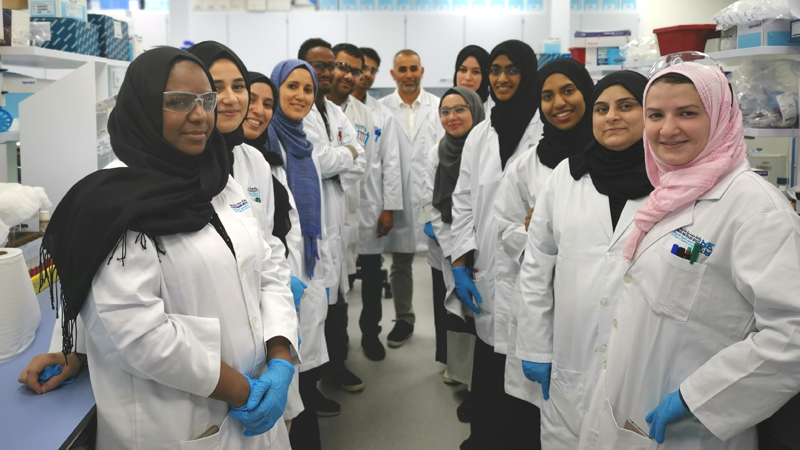
HBKU’s College of Health and Life Sciences Workshop Advances Laboratory Skills of Graduate Students
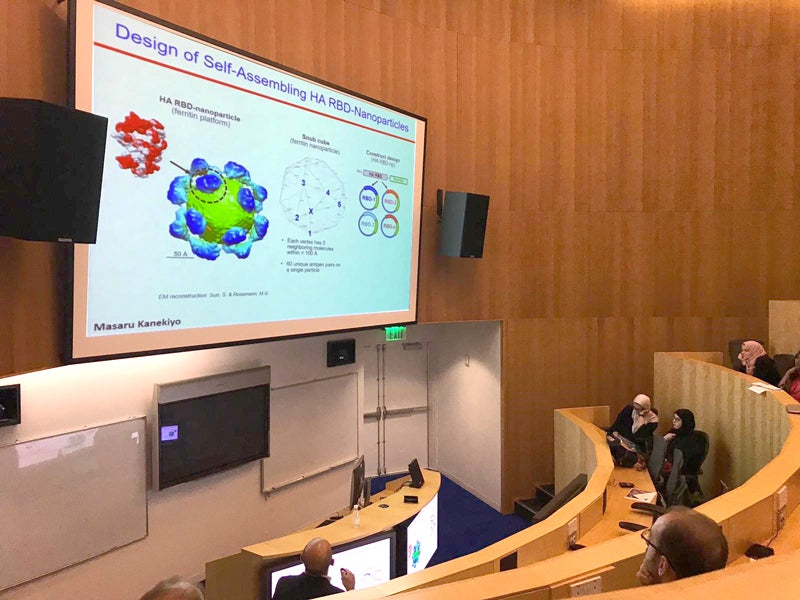
HBKU’s College of Health and Life Sciences Hosts Seminar on Influenza Vaccines
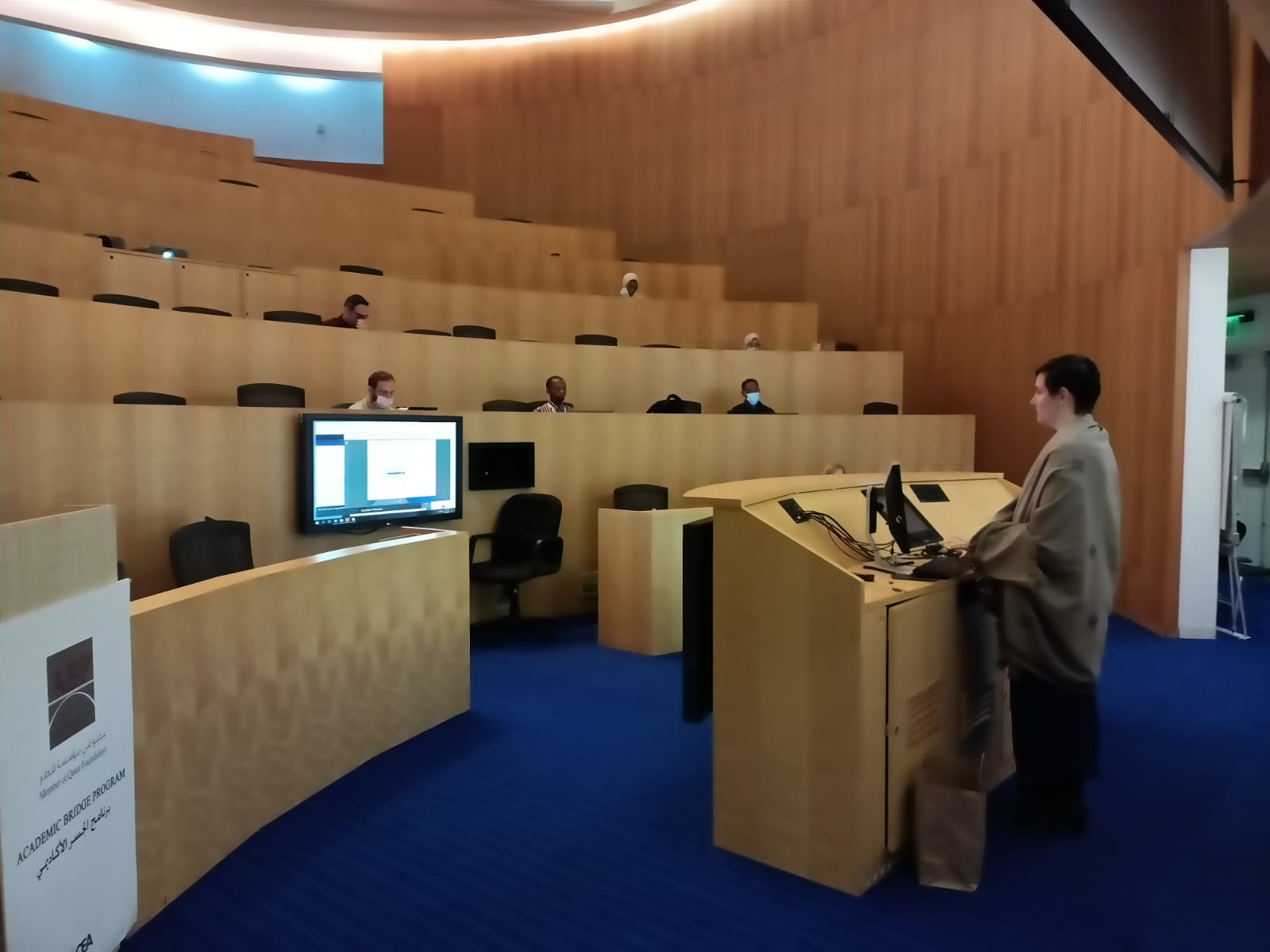
College of Health and Life Science Equips Physicians to Analyze and Interpret Genetic Variation
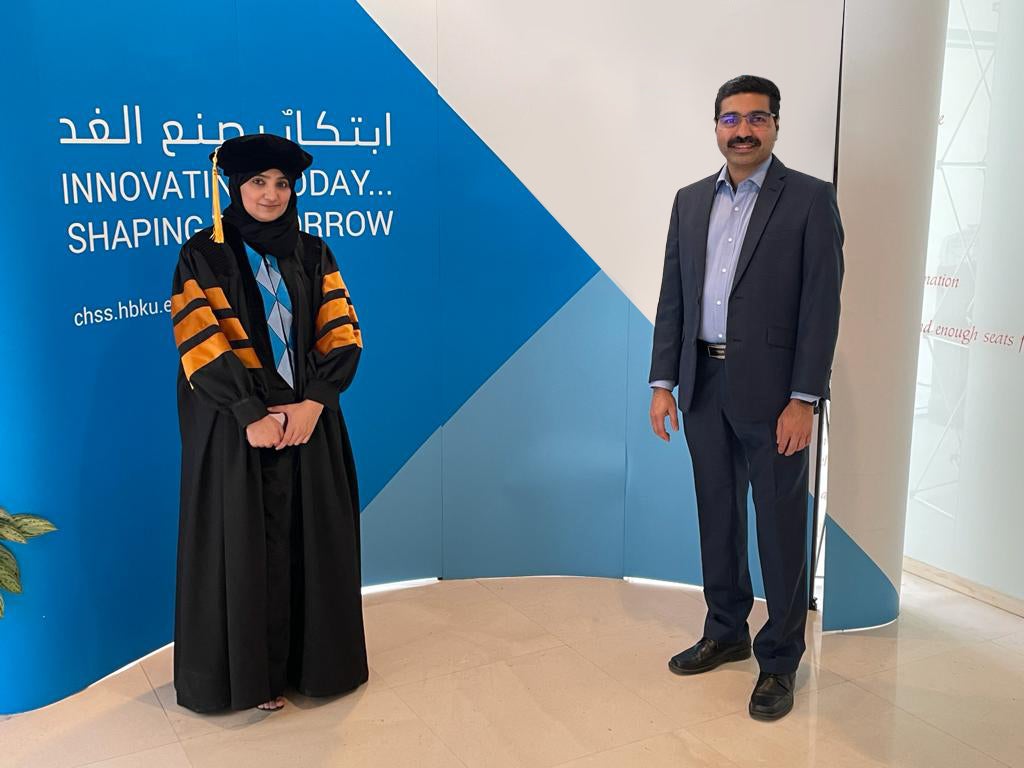
CHLS Aims at Precision Medicine Approach with Research on Antidepressant Prescription Trends in Qatar
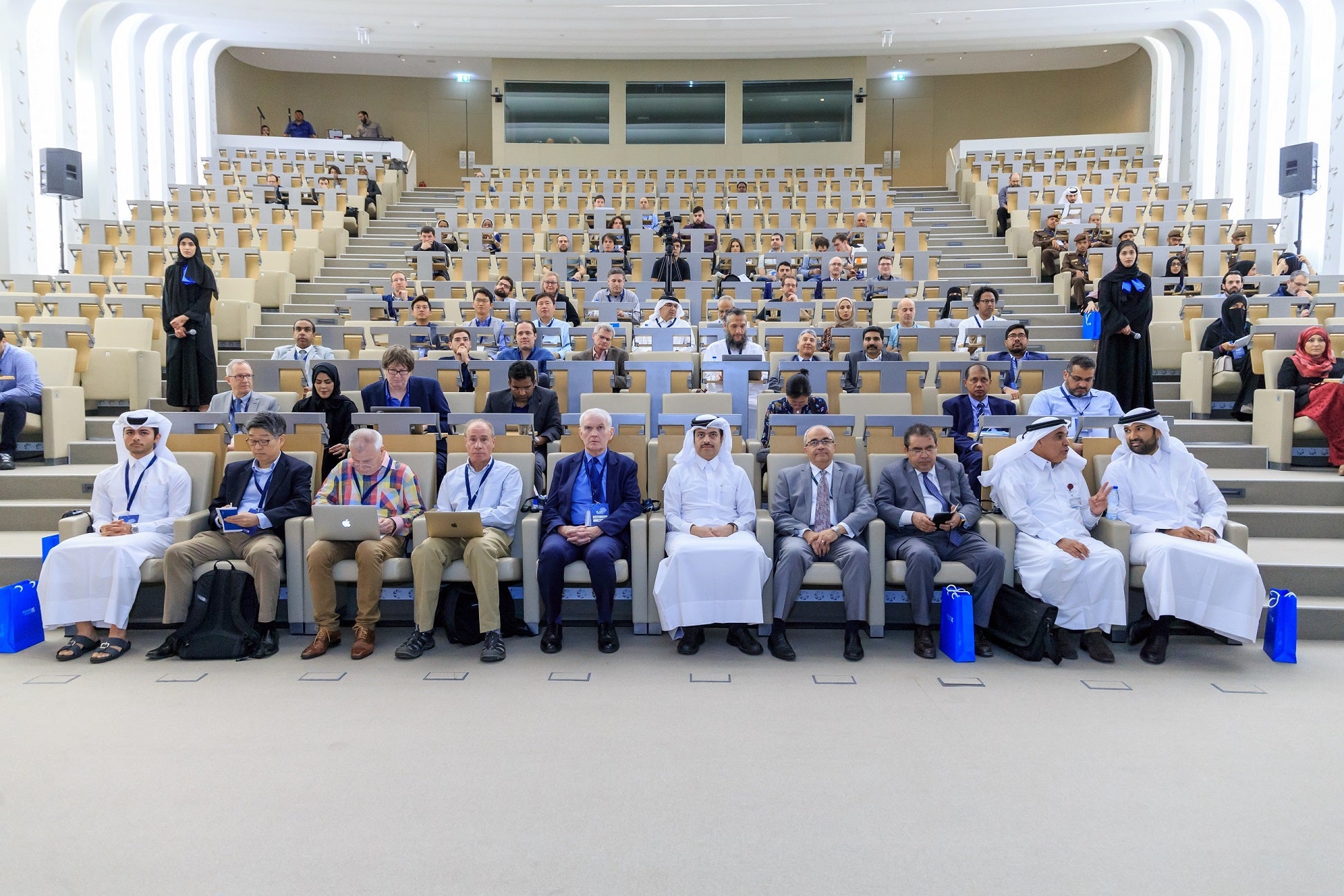
College of Health and Life Sciences Hosts International Conference for Advanced Neurotechnology

College of Health and Life Sciences Seminar Considers Latest Research on Tumor Progression
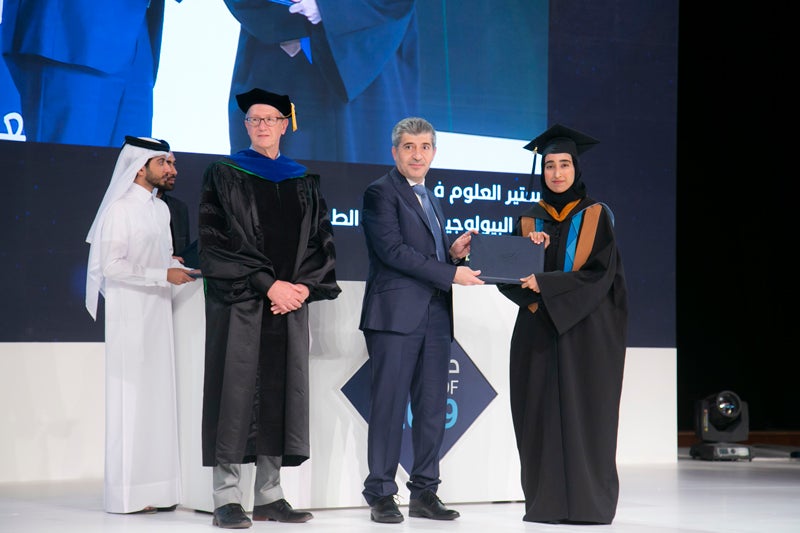
HBKU’s College of Health and Life Sciences Graduates Tackling Qatar’s Pressing Challenges

HBKU College of Health and Life Sciences and Equine Veterinary Medical Center Sign MoU

HBKU’s College of Health and Life Sciences Workshop Advances Laboratory Skills of Graduate Students

HBKU’s College of Health and Life Sciences Hosts Seminar on Influenza Vaccines

College of Health and Life Science Equips Physicians to Analyze and Interpret Genetic Variation

CHLS Aims at Precision Medicine Approach with Research on Antidepressant Prescription Trends in Qatar

College of Health and Life Sciences Hosts International Conference for Advanced Neurotechnology

College of Health and Life Sciences Seminar Considers Latest Research on Tumor Progression

HBKU’s College of Health and Life Sciences Graduates Tackling Qatar’s Pressing Challenges

HBKU College of Health and Life Sciences and Equine Veterinary Medical Center Sign MoU

HBKU’s College of Health and Life Sciences Workshop Advances Laboratory Skills of Graduate Students

HBKU’s College of Health and Life Sciences Hosts Seminar on Influenza Vaccines

College of Health and Life Science Equips Physicians to Analyze and Interpret Genetic Variation

CHLS Aims at Precision Medicine Approach with Research on Antidepressant Prescription Trends in Qatar

College of Health and Life Sciences Hosts International Conference for Advanced Neurotechnology

College of Health and Life Sciences Seminar Considers Latest Research on Tumor Progression

HBKU’s College of Health and Life Sciences Graduates Tackling Qatar’s Pressing Challenges

HBKU College of Health and Life Sciences and Equine Veterinary Medical Center Sign MoU

HBKU’s College of Health and Life Sciences Workshop Advances Laboratory Skills of Graduate Students

HBKU’s College of Health and Life Sciences Hosts Seminar on Influenza Vaccines

College of Health and Life Science Equips Physicians to Analyze and Interpret Genetic Variation

CHLS Aims at Precision Medicine Approach with Research on Antidepressant Prescription Trends in Qatar

College of Health and Life Sciences Hosts International Conference for Advanced Neurotechnology

College of Health and Life Sciences Seminar Considers Latest Research on Tumor Progression

HBKU’s College of Health and Life Sciences Graduates Tackling Qatar’s Pressing Challenges

HBKU College of Health and Life Sciences and Equine Veterinary Medical Center Sign MoU

HBKU’s College of Health and Life Sciences Workshop Advances Laboratory Skills of Graduate Students

HBKU’s College of Health and Life Sciences Hosts Seminar on Influenza Vaccines

College of Health and Life Science Equips Physicians to Analyze and Interpret Genetic Variation

CHLS Aims at Precision Medicine Approach with Research on Antidepressant Prescription Trends in Qatar

College of Health and Life Sciences Hosts International Conference for Advanced Neurotechnology

College of Health and Life Sciences Seminar Considers Latest Research on Tumor Progression

HBKU’s College of Health and Life Sciences Graduates Tackling Qatar’s Pressing Challenges

HBKU College of Health and Life Sciences and Equine Veterinary Medical Center Sign MoU

HBKU’s College of Health and Life Sciences Workshop Advances Laboratory Skills of Graduate Students

HBKU’s College of Health and Life Sciences Hosts Seminar on Influenza Vaccines

College of Health and Life Science Equips Physicians to Analyze and Interpret Genetic Variation

CHLS Aims at Precision Medicine Approach with Research on Antidepressant Prescription Trends in Qatar

College of Health and Life Sciences Hosts International Conference for Advanced Neurotechnology

College of Health and Life Sciences Seminar Considers Latest Research on Tumor Progression

HBKU’s College of Health and Life Sciences Graduates Tackling Qatar’s Pressing Challenges

HBKU College of Health and Life Sciences and Equine Veterinary Medical Center Sign MoU

HBKU’s College of Health and Life Sciences Workshop Advances Laboratory Skills of Graduate Students

HBKU’s College of Health and Life Sciences Hosts Seminar on Influenza Vaccines

College of Health and Life Science Equips Physicians to Analyze and Interpret Genetic Variation

CHLS Aims at Precision Medicine Approach with Research on Antidepressant Prescription Trends in Qatar

College of Health and Life Sciences Hosts International Conference for Advanced Neurotechnology

College of Health and Life Sciences Seminar Considers Latest Research on Tumor Progression

HBKU’s College of Health and Life Sciences Graduates Tackling Qatar’s Pressing Challenges

HBKU College of Health and Life Sciences and Equine Veterinary Medical Center Sign MoU

HBKU’s College of Health and Life Sciences Workshop Advances Laboratory Skills of Graduate Students

HBKU’s College of Health and Life Sciences Hosts Seminar on Influenza Vaccines

College of Health and Life Science Equips Physicians to Analyze and Interpret Genetic Variation

CHLS Aims at Precision Medicine Approach with Research on Antidepressant Prescription Trends in Qatar

College of Health and Life Sciences Hosts International Conference for Advanced Neurotechnology

College of Health and Life Sciences Seminar Considers Latest Research on Tumor Progression

HBKU’s College of Health and Life Sciences Graduates Tackling Qatar’s Pressing Challenges

HBKU College of Health and Life Sciences and Equine Veterinary Medical Center Sign MoU

HBKU’s College of Health and Life Sciences Workshop Advances Laboratory Skills of Graduate Students

HBKU’s College of Health and Life Sciences Hosts Seminar on Influenza Vaccines

College of Health and Life Science Equips Physicians to Analyze and Interpret Genetic Variation

CHLS Aims at Precision Medicine Approach with Research on Antidepressant Prescription Trends in Qatar

College of Health and Life Sciences Hosts International Conference for Advanced Neurotechnology

College of Health and Life Sciences Seminar Considers Latest Research on Tumor Progression

HBKU’s College of Health and Life Sciences Graduates Tackling Qatar’s Pressing Challenges

HBKU College of Health and Life Sciences and Equine Veterinary Medical Center Sign MoU

HBKU’s College of Health and Life Sciences Workshop Advances Laboratory Skills of Graduate Students

HBKU’s College of Health and Life Sciences Hosts Seminar on Influenza Vaccines

College of Health and Life Science Equips Physicians to Analyze and Interpret Genetic Variation

CHLS Aims at Precision Medicine Approach with Research on Antidepressant Prescription Trends in Qatar

College of Health and Life Sciences Hosts International Conference for Advanced Neurotechnology

College of Health and Life Sciences Seminar Considers Latest Research on Tumor Progression

HBKU’s College of Health and Life Sciences Graduates Tackling Qatar’s Pressing Challenges

HBKU College of Health and Life Sciences and Equine Veterinary Medical Center Sign MoU

HBKU’s College of Health and Life Sciences Workshop Advances Laboratory Skills of Graduate Students

HBKU’s College of Health and Life Sciences Hosts Seminar on Influenza Vaccines

College of Health and Life Science Equips Physicians to Analyze and Interpret Genetic Variation

CHLS Aims at Precision Medicine Approach with Research on Antidepressant Prescription Trends in Qatar

College of Health and Life Sciences Hosts International Conference for Advanced Neurotechnology

College of Health and Life Sciences Seminar Considers Latest Research on Tumor Progression

HBKU’s College of Health and Life Sciences Graduates Tackling Qatar’s Pressing Challenges

HBKU College of Health and Life Sciences and Equine Veterinary Medical Center Sign MoU

HBKU’s College of Health and Life Sciences Workshop Advances Laboratory Skills of Graduate Students

HBKU’s College of Health and Life Sciences Hosts Seminar on Influenza Vaccines

College of Health and Life Science Equips Physicians to Analyze and Interpret Genetic Variation

CHLS Aims at Precision Medicine Approach with Research on Antidepressant Prescription Trends in Qatar

College of Health and Life Sciences Hosts International Conference for Advanced Neurotechnology

College of Health and Life Sciences Seminar Considers Latest Research on Tumor Progression

HBKU’s College of Health and Life Sciences Graduates Tackling Qatar’s Pressing Challenges

HBKU College of Health and Life Sciences and Equine Veterinary Medical Center Sign MoU

HBKU’s College of Health and Life Sciences Workshop Advances Laboratory Skills of Graduate Students

HBKU’s College of Health and Life Sciences Hosts Seminar on Influenza Vaccines

College of Health and Life Science Equips Physicians to Analyze and Interpret Genetic Variation

CHLS Aims at Precision Medicine Approach with Research on Antidepressant Prescription Trends in Qatar

College of Health and Life Sciences Hosts International Conference for Advanced Neurotechnology

College of Health and Life Sciences Seminar Considers Latest Research on Tumor Progression

HBKU’s College of Health and Life Sciences Graduates Tackling Qatar’s Pressing Challenges

HBKU College of Health and Life Sciences and Equine Veterinary Medical Center Sign MoU

HBKU’s College of Health and Life Sciences Workshop Advances Laboratory Skills of Graduate Students

HBKU’s College of Health and Life Sciences Hosts Seminar on Influenza Vaccines

College of Health and Life Science Equips Physicians to Analyze and Interpret Genetic Variation

CHLS Aims at Precision Medicine Approach with Research on Antidepressant Prescription Trends in Qatar

College of Health and Life Sciences Hosts International Conference for Advanced Neurotechnology

College of Health and Life Sciences Seminar Considers Latest Research on Tumor Progression

HBKU’s College of Health and Life Sciences Graduates Tackling Qatar’s Pressing Challenges

HBKU College of Health and Life Sciences and Equine Veterinary Medical Center Sign MoU

HBKU’s College of Health and Life Sciences Workshop Advances Laboratory Skills of Graduate Students

HBKU’s College of Health and Life Sciences Hosts Seminar on Influenza Vaccines

College of Health and Life Science Equips Physicians to Analyze and Interpret Genetic Variation

CHLS Aims at Precision Medicine Approach with Research on Antidepressant Prescription Trends in Qatar

College of Health and Life Sciences Hosts International Conference for Advanced Neurotechnology

College of Health and Life Sciences Seminar Considers Latest Research on Tumor Progression

HBKU’s College of Health and Life Sciences Graduates Tackling Qatar’s Pressing Challenges

HBKU College of Health and Life Sciences and Equine Veterinary Medical Center Sign MoU

HBKU’s College of Health and Life Sciences Workshop Advances Laboratory Skills of Graduate Students

HBKU’s College of Health and Life Sciences Hosts Seminar on Influenza Vaccines

College of Health and Life Science Equips Physicians to Analyze and Interpret Genetic Variation

CHLS Aims at Precision Medicine Approach with Research on Antidepressant Prescription Trends in Qatar

College of Health and Life Sciences Hosts International Conference for Advanced Neurotechnology

College of Health and Life Sciences Seminar Considers Latest Research on Tumor Progression

HBKU’s College of Health and Life Sciences Graduates Tackling Qatar’s Pressing Challenges

HBKU College of Health and Life Sciences and Equine Veterinary Medical Center Sign MoU

HBKU’s College of Health and Life Sciences Workshop Advances Laboratory Skills of Graduate Students

HBKU’s College of Health and Life Sciences Hosts Seminar on Influenza Vaccines

College of Health and Life Science Equips Physicians to Analyze and Interpret Genetic Variation

CHLS Aims at Precision Medicine Approach with Research on Antidepressant Prescription Trends in Qatar

College of Health and Life Sciences Hosts International Conference for Advanced Neurotechnology

College of Health and Life Sciences Seminar Considers Latest Research on Tumor Progression

HBKU’s College of Health and Life Sciences Graduates Tackling Qatar’s Pressing Challenges

HBKU College of Health and Life Sciences and Equine Veterinary Medical Center Sign MoU

HBKU’s College of Health and Life Sciences Workshop Advances Laboratory Skills of Graduate Students

HBKU’s College of Health and Life Sciences Hosts Seminar on Influenza Vaccines

College of Health and Life Science Equips Physicians to Analyze and Interpret Genetic Variation

CHLS Aims at Precision Medicine Approach with Research on Antidepressant Prescription Trends in Qatar

College of Health and Life Sciences Hosts International Conference for Advanced Neurotechnology

College of Health and Life Sciences Seminar Considers Latest Research on Tumor Progression

HBKU’s College of Health and Life Sciences Graduates Tackling Qatar’s Pressing Challenges

HBKU College of Health and Life Sciences and Equine Veterinary Medical Center Sign MoU

HBKU’s College of Health and Life Sciences Workshop Advances Laboratory Skills of Graduate Students

HBKU’s College of Health and Life Sciences Hosts Seminar on Influenza Vaccines

College of Health and Life Science Equips Physicians to Analyze and Interpret Genetic Variation

CHLS Aims at Precision Medicine Approach with Research on Antidepressant Prescription Trends in Qatar

College of Health and Life Sciences Hosts International Conference for Advanced Neurotechnology

College of Health and Life Sciences Seminar Considers Latest Research on Tumor Progression

HBKU’s College of Health and Life Sciences Graduates Tackling Qatar’s Pressing Challenges

HBKU College of Health and Life Sciences and Equine Veterinary Medical Center Sign MoU

HBKU’s College of Health and Life Sciences Workshop Advances Laboratory Skills of Graduate Students

HBKU’s College of Health and Life Sciences Hosts Seminar on Influenza Vaccines

College of Health and Life Science Equips Physicians to Analyze and Interpret Genetic Variation

CHLS Aims at Precision Medicine Approach with Research on Antidepressant Prescription Trends in Qatar

College of Health and Life Sciences Hosts International Conference for Advanced Neurotechnology

College of Health and Life Sciences Seminar Considers Latest Research on Tumor Progression

HBKU’s College of Health and Life Sciences Graduates Tackling Qatar’s Pressing Challenges

HBKU College of Health and Life Sciences and Equine Veterinary Medical Center Sign MoU

HBKU’s College of Health and Life Sciences Workshop Advances Laboratory Skills of Graduate Students

HBKU’s College of Health and Life Sciences Hosts Seminar on Influenza Vaccines

College of Health and Life Science Equips Physicians to Analyze and Interpret Genetic Variation

CHLS Aims at Precision Medicine Approach with Research on Antidepressant Prescription Trends in Qatar

College of Health and Life Sciences Hosts International Conference for Advanced Neurotechnology

College of Health and Life Sciences Seminar Considers Latest Research on Tumor Progression

HBKU’s College of Health and Life Sciences Graduates Tackling Qatar’s Pressing Challenges

HBKU College of Health and Life Sciences and Equine Veterinary Medical Center Sign MoU

HBKU’s College of Health and Life Sciences Workshop Advances Laboratory Skills of Graduate Students

HBKU’s College of Health and Life Sciences Hosts Seminar on Influenza Vaccines

College of Health and Life Science Equips Physicians to Analyze and Interpret Genetic Variation

CHLS Aims at Precision Medicine Approach with Research on Antidepressant Prescription Trends in Qatar

College of Health and Life Sciences Hosts International Conference for Advanced Neurotechnology

College of Health and Life Sciences Seminar Considers Latest Research on Tumor Progression

HBKU’s College of Health and Life Sciences Graduates Tackling Qatar’s Pressing Challenges

HBKU College of Health and Life Sciences and Equine Veterinary Medical Center Sign MoU

HBKU’s College of Health and Life Sciences Workshop Advances Laboratory Skills of Graduate Students

HBKU’s College of Health and Life Sciences Hosts Seminar on Influenza Vaccines

College of Health and Life Science Equips Physicians to Analyze and Interpret Genetic Variation

CHLS Aims at Precision Medicine Approach with Research on Antidepressant Prescription Trends in Qatar

College of Health and Life Sciences Hosts International Conference for Advanced Neurotechnology

College of Health and Life Sciences Seminar Considers Latest Research on Tumor Progression

HBKU’s College of Health and Life Sciences Graduates Tackling Qatar’s Pressing Challenges

HBKU College of Health and Life Sciences and Equine Veterinary Medical Center Sign MoU

HBKU’s College of Health and Life Sciences Workshop Advances Laboratory Skills of Graduate Students

HBKU’s College of Health and Life Sciences Hosts Seminar on Influenza Vaccines

College of Health and Life Science Equips Physicians to Analyze and Interpret Genetic Variation

CHLS Aims at Precision Medicine Approach with Research on Antidepressant Prescription Trends in Qatar

College of Health and Life Sciences Hosts International Conference for Advanced Neurotechnology

College of Health and Life Sciences Seminar Considers Latest Research on Tumor Progression

HBKU’s College of Health and Life Sciences Graduates Tackling Qatar’s Pressing Challenges

HBKU College of Health and Life Sciences and Equine Veterinary Medical Center Sign MoU

HBKU’s College of Health and Life Sciences Workshop Advances Laboratory Skills of Graduate Students

HBKU’s College of Health and Life Sciences Hosts Seminar on Influenza Vaccines

College of Health and Life Science Equips Physicians to Analyze and Interpret Genetic Variation

CHLS Aims at Precision Medicine Approach with Research on Antidepressant Prescription Trends in Qatar

College of Health and Life Sciences Hosts International Conference for Advanced Neurotechnology

College of Health and Life Sciences Seminar Considers Latest Research on Tumor Progression

HBKU’s College of Health and Life Sciences Graduates Tackling Qatar’s Pressing Challenges

HBKU College of Health and Life Sciences and Equine Veterinary Medical Center Sign MoU

HBKU’s College of Health and Life Sciences Workshop Advances Laboratory Skills of Graduate Students

HBKU’s College of Health and Life Sciences Hosts Seminar on Influenza Vaccines

College of Health and Life Science Equips Physicians to Analyze and Interpret Genetic Variation

CHLS Aims at Precision Medicine Approach with Research on Antidepressant Prescription Trends in Qatar

College of Health and Life Sciences Hosts International Conference for Advanced Neurotechnology

College of Health and Life Sciences Seminar Considers Latest Research on Tumor Progression

HBKU’s College of Health and Life Sciences Graduates Tackling Qatar’s Pressing Challenges

HBKU College of Health and Life Sciences and Equine Veterinary Medical Center Sign MoU

HBKU’s College of Health and Life Sciences Workshop Advances Laboratory Skills of Graduate Students

HBKU’s College of Health and Life Sciences Hosts Seminar on Influenza Vaccines

College of Health and Life Science Equips Physicians to Analyze and Interpret Genetic Variation

CHLS Aims at Precision Medicine Approach with Research on Antidepressant Prescription Trends in Qatar

College of Health and Life Sciences Hosts International Conference for Advanced Neurotechnology

College of Health and Life Sciences Seminar Considers Latest Research on Tumor Progression

HBKU’s College of Health and Life Sciences Graduates Tackling Qatar’s Pressing Challenges

HBKU College of Health and Life Sciences and Equine Veterinary Medical Center Sign MoU

HBKU’s College of Health and Life Sciences Workshop Advances Laboratory Skills of Graduate Students

HBKU’s College of Health and Life Sciences Hosts Seminar on Influenza Vaccines

College of Health and Life Science Equips Physicians to Analyze and Interpret Genetic Variation

CHLS Aims at Precision Medicine Approach with Research on Antidepressant Prescription Trends in Qatar

College of Health and Life Sciences Hosts International Conference for Advanced Neurotechnology

College of Health and Life Sciences Seminar Considers Latest Research on Tumor Progression

HBKU’s College of Health and Life Sciences Graduates Tackling Qatar’s Pressing Challenges

HBKU College of Health and Life Sciences and Equine Veterinary Medical Center Sign MoU

HBKU’s College of Health and Life Sciences Workshop Advances Laboratory Skills of Graduate Students

HBKU’s College of Health and Life Sciences Hosts Seminar on Influenza Vaccines

College of Health and Life Science Equips Physicians to Analyze and Interpret Genetic Variation

CHLS Aims at Precision Medicine Approach with Research on Antidepressant Prescription Trends in Qatar

College of Health and Life Sciences Hosts International Conference for Advanced Neurotechnology

College of Health and Life Sciences Seminar Considers Latest Research on Tumor Progression

HBKU’s College of Health and Life Sciences Graduates Tackling Qatar’s Pressing Challenges

HBKU College of Health and Life Sciences and Equine Veterinary Medical Center Sign MoU

HBKU’s College of Health and Life Sciences Workshop Advances Laboratory Skills of Graduate Students

HBKU’s College of Health and Life Sciences Hosts Seminar on Influenza Vaccines

College of Health and Life Science Equips Physicians to Analyze and Interpret Genetic Variation

CHLS Aims at Precision Medicine Approach with Research on Antidepressant Prescription Trends in Qatar

College of Health and Life Sciences Hosts International Conference for Advanced Neurotechnology

College of Health and Life Sciences Seminar Considers Latest Research on Tumor Progression

HBKU’s College of Health and Life Sciences Graduates Tackling Qatar’s Pressing Challenges

HBKU College of Health and Life Sciences and Equine Veterinary Medical Center Sign MoU

HBKU’s College of Health and Life Sciences Workshop Advances Laboratory Skills of Graduate Students

HBKU’s College of Health and Life Sciences Hosts Seminar on Influenza Vaccines

College of Health and Life Science Equips Physicians to Analyze and Interpret Genetic Variation

CHLS Aims at Precision Medicine Approach with Research on Antidepressant Prescription Trends in Qatar

College of Health and Life Sciences Hosts International Conference for Advanced Neurotechnology

College of Health and Life Sciences Seminar Considers Latest Research on Tumor Progression

HBKU’s College of Health and Life Sciences Graduates Tackling Qatar’s Pressing Challenges

HBKU College of Health and Life Sciences and Equine Veterinary Medical Center Sign MoU

HBKU’s College of Health and Life Sciences Workshop Advances Laboratory Skills of Graduate Students

HBKU’s College of Health and Life Sciences Hosts Seminar on Influenza Vaccines

College of Health and Life Science Equips Physicians to Analyze and Interpret Genetic Variation

CHLS Aims at Precision Medicine Approach with Research on Antidepressant Prescription Trends in Qatar

College of Health and Life Sciences Hosts International Conference for Advanced Neurotechnology

College of Health and Life Sciences Seminar Considers Latest Research on Tumor Progression

HBKU’s College of Health and Life Sciences Graduates Tackling Qatar’s Pressing Challenges

HBKU College of Health and Life Sciences and Equine Veterinary Medical Center Sign MoU

HBKU’s College of Health and Life Sciences Workshop Advances Laboratory Skills of Graduate Students

HBKU’s College of Health and Life Sciences Hosts Seminar on Influenza Vaccines

College of Health and Life Science Equips Physicians to Analyze and Interpret Genetic Variation

CHLS Aims at Precision Medicine Approach with Research on Antidepressant Prescription Trends in Qatar

College of Health and Life Sciences Hosts International Conference for Advanced Neurotechnology

College of Health and Life Sciences Seminar Considers Latest Research on Tumor Progression

HBKU’s College of Health and Life Sciences Graduates Tackling Qatar’s Pressing Challenges

HBKU College of Health and Life Sciences and Equine Veterinary Medical Center Sign MoU

HBKU’s College of Health and Life Sciences Workshop Advances Laboratory Skills of Graduate Students

HBKU’s College of Health and Life Sciences Hosts Seminar on Influenza Vaccines

College of Health and Life Science Equips Physicians to Analyze and Interpret Genetic Variation

CHLS Aims at Precision Medicine Approach with Research on Antidepressant Prescription Trends in Qatar

College of Health and Life Sciences Hosts International Conference for Advanced Neurotechnology

College of Health and Life Sciences Seminar Considers Latest Research on Tumor Progression

HBKU’s College of Health and Life Sciences Graduates Tackling Qatar’s Pressing Challenges

HBKU College of Health and Life Sciences and Equine Veterinary Medical Center Sign MoU

HBKU’s College of Health and Life Sciences Workshop Advances Laboratory Skills of Graduate Students

HBKU’s College of Health and Life Sciences Hosts Seminar on Influenza Vaccines

College of Health and Life Science Equips Physicians to Analyze and Interpret Genetic Variation

CHLS Aims at Precision Medicine Approach with Research on Antidepressant Prescription Trends in Qatar

College of Health and Life Sciences Hosts International Conference for Advanced Neurotechnology

College of Health and Life Sciences Seminar Considers Latest Research on Tumor Progression

HBKU’s College of Health and Life Sciences Graduates Tackling Qatar’s Pressing Challenges

HBKU College of Health and Life Sciences and Equine Veterinary Medical Center Sign MoU

HBKU’s College of Health and Life Sciences Workshop Advances Laboratory Skills of Graduate Students

HBKU’s College of Health and Life Sciences Hosts Seminar on Influenza Vaccines

College of Health and Life Science Equips Physicians to Analyze and Interpret Genetic Variation

CHLS Aims at Precision Medicine Approach with Research on Antidepressant Prescription Trends in Qatar

College of Health and Life Sciences Hosts International Conference for Advanced Neurotechnology

College of Health and Life Sciences Seminar Considers Latest Research on Tumor Progression

HBKU’s College of Health and Life Sciences Graduates Tackling Qatar’s Pressing Challenges

HBKU College of Health and Life Sciences and Equine Veterinary Medical Center Sign MoU

HBKU’s College of Health and Life Sciences Workshop Advances Laboratory Skills of Graduate Students

HBKU’s College of Health and Life Sciences Hosts Seminar on Influenza Vaccines

College of Health and Life Science Equips Physicians to Analyze and Interpret Genetic Variation

CHLS Aims at Precision Medicine Approach with Research on Antidepressant Prescription Trends in Qatar

College of Health and Life Sciences Hosts International Conference for Advanced Neurotechnology

College of Health and Life Sciences Seminar Considers Latest Research on Tumor Progression

HBKU’s College of Health and Life Sciences Graduates Tackling Qatar’s Pressing Challenges

HBKU College of Health and Life Sciences and Equine Veterinary Medical Center Sign MoU

HBKU’s College of Health and Life Sciences Workshop Advances Laboratory Skills of Graduate Students

HBKU’s College of Health and Life Sciences Hosts Seminar on Influenza Vaccines

College of Health and Life Science Equips Physicians to Analyze and Interpret Genetic Variation

CHLS Aims at Precision Medicine Approach with Research on Antidepressant Prescription Trends in Qatar

College of Health and Life Sciences Hosts International Conference for Advanced Neurotechnology

College of Health and Life Sciences Seminar Considers Latest Research on Tumor Progression

HBKU’s College of Health and Life Sciences Graduates Tackling Qatar’s Pressing Challenges

HBKU College of Health and Life Sciences and Equine Veterinary Medical Center Sign MoU

HBKU’s College of Health and Life Sciences Workshop Advances Laboratory Skills of Graduate Students

HBKU’s College of Health and Life Sciences Hosts Seminar on Influenza Vaccines

College of Health and Life Science Equips Physicians to Analyze and Interpret Genetic Variation

CHLS Aims at Precision Medicine Approach with Research on Antidepressant Prescription Trends in Qatar

College of Health and Life Sciences Hosts International Conference for Advanced Neurotechnology

College of Health and Life Sciences Seminar Considers Latest Research on Tumor Progression

HBKU’s College of Health and Life Sciences Graduates Tackling Qatar’s Pressing Challenges

HBKU College of Health and Life Sciences and Equine Veterinary Medical Center Sign MoU

HBKU’s College of Health and Life Sciences Workshop Advances Laboratory Skills of Graduate Students

HBKU’s College of Health and Life Sciences Hosts Seminar on Influenza Vaccines

College of Health and Life Science Equips Physicians to Analyze and Interpret Genetic Variation

CHLS Aims at Precision Medicine Approach with Research on Antidepressant Prescription Trends in Qatar

College of Health and Life Sciences Hosts International Conference for Advanced Neurotechnology

College of Health and Life Sciences Seminar Considers Latest Research on Tumor Progression

HBKU’s College of Health and Life Sciences Graduates Tackling Qatar’s Pressing Challenges

HBKU College of Health and Life Sciences and Equine Veterinary Medical Center Sign MoU

HBKU’s College of Health and Life Sciences Workshop Advances Laboratory Skills of Graduate Students






